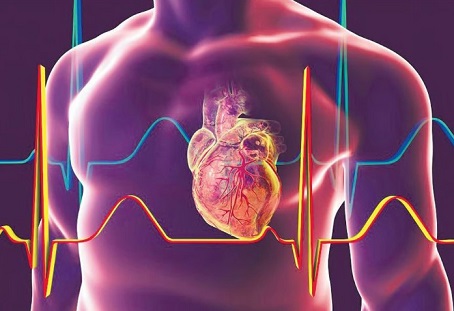Nikhil Prasad Fact checked by:Thailand Medical News Team Jul 02, 2024 10 months, 6 days, 21 hours, 54 minutes ago
HIV, the virus known for causing AIDS, also poses a higher risk for heart disease among those infected. This increased risk comes from a mix of factors, including the virus itself, other infections, and the medications used to treat HIV. This
HIV News report is based on a study review by researchers from MetroHealth Medical Center and Case Western Reserve University-USA, Emory University-USA, Vanderbilt University Medical Center-USA and Washington University in St. Louis-USA that explored why people living with HIV (PLWH) are more likely to suffer from atherosclerosis, a condition where arteries become clogged, leading to serious heart problems.
 HIV Increases Heart Disease Risk
The Growing Heart Disease Risk in HIV Patients
HIV Increases Heart Disease Risk
The Growing Heart Disease Risk in HIV Patients
Heart disease is a major concern for PLWH. Over the past few decades, the rate of HIV-related heart disease has tripled. PLWH are more than twice as likely to develop cardiovascular disease (CVD) or have a heart attack compared to those without HIV. Traditional risk factors like high blood pressure and cholesterol affect everyone, but PLWH face unique challenges.
How HIV and Its Treatment Affect the Heart
HIV itself and the antiretroviral therapy (ART) used to manage it contribute to heart disease risk. Older HIV medications, particularly some protease inhibitors, are known to increase this risk. Despite advancements in treatment, the virus still causes chronic inflammation and immune system disruptions, which are key drivers of atherosclerosis.
Inflammation and Immune Response
Chronic inflammation is a hallmark of HIV infection. The virus stimulates a constant immune response, leading to persistent inflammation. This ongoing inflammation damages blood vessels and contributes to plaque buildup in the arteries. The presence of other infections, like hepatitis C or herpes, can worsen this inflammation and further increase heart disease risk.
The Role of Co-Infections
Many PLWH also struggle with other infections, which add to their health challenges. Viruses like cytomegalovirus (CMV) and herpes simplex virus (HSV) can intensify the immune system's response, leading to more inflammation and greater risk of heart disease. These co-infections complicate the health picture for PLWH, making it even more crucial to manage their overall health carefully.
Lipid Abnormalities
PLWH often have abnormal lipid levels, which contribute to heart disease. They tend to have lower levels of good cholesterol (HDL) and higher levels of triglycerides. These lipid abnormalities, combined with chronic inflammation, accelerate the development of atherosclerosis.
Gut Health and Systemic Inflammation
The gut plays a crucial role in immune health. In PLWH, the gut's mucosal barrier is often compromised, leading to microbial translocation - where bacteria and their products leak into the bloodstream. This leakage causes systemic inflammation, further increasing the risk of heart disease.
Substance Use and
Its Impact
Substance use is more common among PLWH, adding another layer of risk. Drugs like heroin, cocaine, and methamphetamines, as well as tobacco and cannabis, have significant effects on the cardiovascular system. Heroin use, for example, is associated with increased aortic inflammation, while stimulants like cocaine and methamphetamine raise levels of inflammatory markers.
Potential Treatments and Interventions
To address the heightened risk of heart disease in PLWH, researchers are exploring various treatments. Some potential interventions include:
-Canakinumab: A monoclonal antibody targeting IL-1β, which reduces inflammation and has shown promise in lowering the rate of recurrent cardiovascular events.
-Tocilizumab: This antibody targets the IL-6 receptor and has been found to reduce inflammation and increase heart muscle recovery in people with heart attacks.
-Statins: Widely used to lower cholesterol, statins also have anti-inflammatory properties. The REPRIEVE trial showed that statins significantly reduce the risk of major cardiovascular events in PLWH.
Lifestyle Changes
In addition to medical treatments, lifestyle changes are vital for reducing heart disease risk. These include:
-Healthy Diet: Eating a balanced diet rich in fruits, vegetables, whole grains, and lean proteins helps manage cholesterol levels and reduces inflammation.
-Regular Exercise: Physical activity strengthens the heart and improves overall cardiovascular health.
-Smoking Cessation: Quitting smoking is one of the most effective ways to reduce heart disease risk.
-Moderation in Alcohol Consumption: Limiting alcohol intake helps prevent high blood pressure and other heart-related issues.
Conclusion
Heart disease is a significant risk for people living with HIV, driven by a complex interplay of factors including chronic inflammation, co-infections, and lipid abnormalities. While managing HIV is crucial, addressing cardiovascular health through both medical treatments and lifestyle changes is equally important. Ongoing research and awareness can help improve the quality of life and longevity for PLWH, ensuring they can live healthier, fuller lives.
The study findings were published in the peer reviewed International Journal of Molecular Sciences.
https://www.mdpi.com/1422-0067/25/13/7266
For the latest
HIV News, keep on logging to Thailand Medical News.
Read Also:
https://www.thailandmedical.news/news/hiv-news-flagellin-a-potential-game-changer-in-hiv-treatment
https://www.thailandmedical.news/news/hiv-news-scientists-discover-naturally-occurring-antiviral-concanamycin-a-that-can-possibly-cure-not-just-treat-hiv 